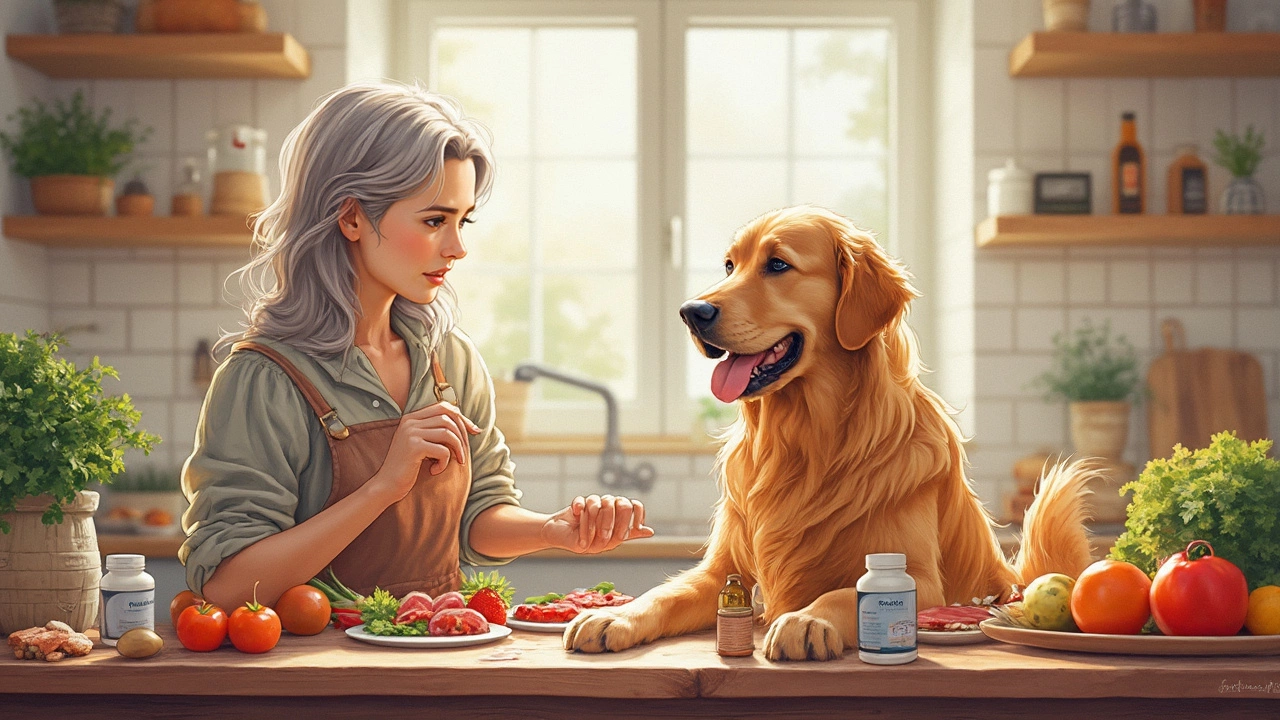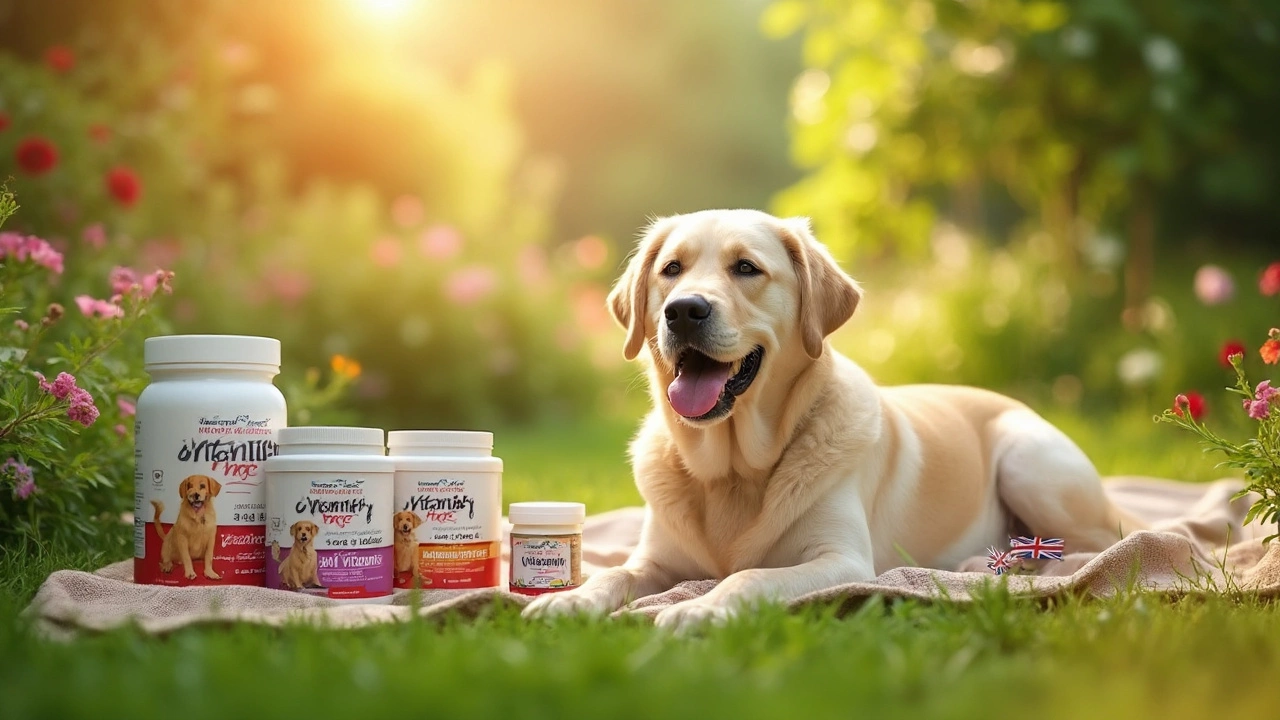Ever noticed your dog isn’t quite their usual playful self? It might be more than just a lazy day; they could be dealing with a vitamin deficiency. Yep, dogs get them too, and when it comes to deficiencies, Vitamin D takes the cake as the most common among our furry friends.
So, what’s the big deal about Vitamin D anyway? It plays a huge role in keeping your dog’s bones strong and supports their immune system. Since dogs can't produce enough Vitamin D just from sunlight, they rely heavily on their diet. That means finding the right balance in dog food or supplements is absolutely key.
If your dog shows signs like muscle weakness, fatigue, or even depression, a lack of Vitamin D might be the culprit. It might be time to reassess their diet or consider adding a supplement to keep them in tip-top shape.
- Why Vitamins Matter for Dogs
- Spotting Vitamin D Deficiency
- How to Ensure Proper Nutrition
- Choosing the Right Supplements
Why Vitamins Matter for Dogs
We often hear about dogs needing a balanced diet, but what's all the fuss about vitamins? Essentially, vitamins are not just an added bonus for your pup's food – they’re crucial for keeping them healthy and bouncing around the house.
Think of them as the tiny powerhouses that help regulate all kinds of bodily functions. Without the right levels, dogs could face anything from dull coats to weak immune systems. That’s definitely not what anyone wants for their furry best friend!
Essential Vitamins for Dogs
So, which vitamins should we be looking out for? Here's a quick rundown:
- Vitamin A: Important for vision, immune function, and cell growth. A lack of this could mean your dog might have issues seeing in low light or experience skin problems.
- Vitamin D: Known as the sunshine vitamin. It helps in keeping bones strong and maintaining a good level of calcium.
- Vitamin E: An antioxidant that protects cells from damage. It’s also great for skin and coat health.
- Vitamin K: Helps with blood clotting – sometimes we overlook how important it is until there's a cut!
These vitamins are found in high-quality dog foods, but it's always good to check the label. Makes you wonder if your current choice is ticking all the boxes, right?
The Role of Dog Health Supplements
Sometimes, not all foods or home-cooked meals offer sufficient nutrients, and that's where dog health supplements come into play. They can fill in nutritional gaps, ensuring dogs get all necessary vitamins. It's like giving them a nutritional safety net.
Adding supplements should always follow a chat with a vet. Too much of anything isn’t great, even vitamins, so always aim for balance.
Spotting Vitamin D Deficiency
Vitamin D deficiency in dogs is sneakier than a puppy with a stolen shoe. It's not always obvious at first, but keeping an eye on your furry buddy can prevent long-term health issues. So, what should you watch out for?
Physical Symptoms
The most common tell-tale signs include muscle weakness, lethargy, and even some depression-like symptoms. Your usually bouncy pooch might be more sluggish or not interested in their favorite toys.
Behavioral Changes
A change in behavior is another red flag. If your doggo seems restless or is acting extra needy, it might not just be a phase—they could be asking for some nutritional help.
Health Complications
Untreated, a Vitamin D deficiency can lead to more serious issues like bone disease or immune system problems. Affected dogs might have difficulty walking or display signs of pain while being handled.
Dr. Linda Simon, a renowned veterinary consultant, notes, "Vitamin D is crucial for bone development and immune function in dogs. If your pet seems off, it’s always best to consult with your vet."
It's important to get regular check-ups. Your vet can run blood tests if they suspect a deficiency, which is the most reliable way to confirm if your dog’s Vitamin D levels are low.
Prevention and Care
Ensuring your dog gets enough Vitamin D typically comes down to diet. Most high-quality pet foods cover this, but supplements are available if you’re concerned about your pup’s intake. Make sure the food label lists an adequate amount of this vital nutrient.
| Common Signs | Possible Actions |
|---|---|
| Lethargy | Visit the vet for assessment and possible supplementation. |
| Weakness | Check diet and consider nutrient-rich dog food. |

How to Ensure Proper Nutrition
Wondering how to keep your dog’s diet on point? Ensuring your furry friend gets the right nutrients, like those found in dog supplements, is super important for their health. Here’s how you can do it.
Understand Their Needs
Every dog is different. Age, breed, size, and even activity level can change what they need nutritionally. Puppies, for instance, need more protein and calories compared to older dogs. Chat with your vet to pin down the specifics for your pup.
Select Quality Dog Foods
Not all dog foods are created equal. Aim for brands that use real meat as the first ingredient and have few fillers like corn or soy. Check the labels; they should ideally have a mix of vitamins, minerals, and even Vitamin D, crucial for preventing deficiencies.
Spotlight on Dog Health Supplements
Thinking about using dog supplements? Supplements can fill in the gaps your dog’s diet might miss. Look for options like fish oil for Omega-3s or specific brands that provide a blend of necessary vitamins your dog might lack.
Homemade Diets: Pros and Cons
If you’re up for it, preparing homemade meals gives you control over every ingredient. However, this requires careful planning to ensure all vitamin needs, especially Vitamin D, are met. A quick tip: collaborate with a canine nutritionist to get your recipes right.
| Nutrient | Daily Requirement (Medium-sized Dog) |
|---|---|
| Protein | 25-30g |
| Fat | 10-15g |
| Vitamin D | 500 IU |
Regular Check-ups
Last but not least, don’t skip those vet visits. Regular check-ups can catch potential deficiencies early and keep your pet’s diet plan on track.
Following these steps not only keeps your dog healthy but can also boost their mood and energy. Happy dog, happy life, right?
Choosing the Right Supplements
Navigating the world of dog supplements, especially when you're concerned about vitamin deficiency, can feel sort of overwhelming. But don't worry — picking the right **dog health** supplements doesn't have to be rocket science. The first step? Knowing what your furry buddy actually needs.
Identify the Needs
If you're concerned about *Vitamin D deficiency*, the good news is that there's a whole range of **dog supplements** out there to help. But before you start, it's a solid idea to have a chat with your vet. They'll help you figure out if a supplement is necessary and recommend a dose that keeps your pet healthy and wagging their tail.
Read Labels Carefully
Those labels aren't just there to look pretty on the shelf. Take a moment to read through what each supplement offers. Look for supplements that are well-balanced and contain essential vitamins and minerals like Vitamin D, calcium, and phosphorus. These can be critical in boosting your dog’s overall health.
Quality Over Quantity
When it comes to **pet nutrition**, more isn't always better. High-quality supplements from reputable brands might cost a bit more, but they often use better ingredients and fewer fillers. Plus, they usually have more reliable data backing up their claims. Your dog's health is worth the investment!
Watch for Artificial Additives
Your pup doesn't need artificial colors or flavor enhancers in their diet. Stick with supplements with natural ingredients. Keep an eye out for words like 'all-natural' or 'organic' on the label.
Here’s a simple checklist:
- Consult with your vet about your dog's specific needs.
- Read labels for essential vitamins like Vitamin D.
- Choose reputable brands for quality assurance.
- Avoid artificial additives and fillers.
Track Your Pet's Progress
Once you pick the right supplement, monitor your dog for any changes. Improved energy levels, better coat condition, and stable moods are good signs that the supplements are doing their job. If you notice any adverse effects, consult your vet.
Remember, the goal is to boost your dog's health without overloading their system with unnecessary vitamins. Keep it simple and focus on quality and balance.
